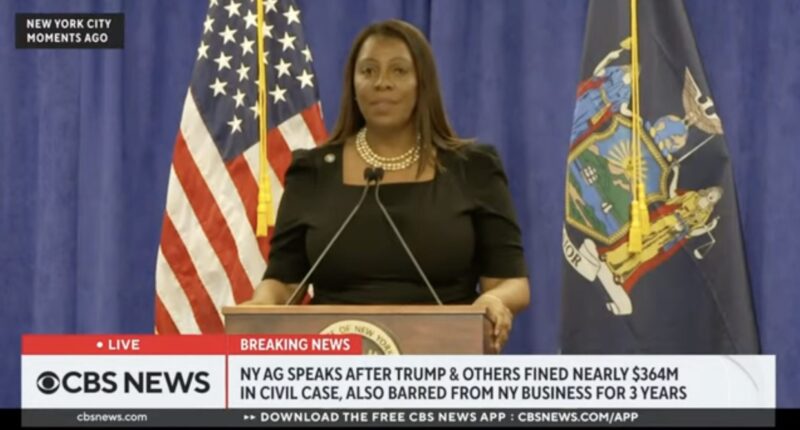A New York appellate court tossed out the “unconstitutional” civil fraud penalty imposed against President Donald Trump by Judge Arthur Engoron in the politically motivated case that sought to kneecap Trump’s ability to campaign in 2024.
Trump was accused by New York Attorney General Letitia James of inflating his personal wealth to get more favorable loan terms. Despite no victims, Engoron ordered Trump to pay $354 million plus an additional $100 million in interest. Trump posted a $175 million bond in April of 2024 and appealed the ruling. The penalty, after accruing interest, hit a whopping $515 million, according to the Washington Examiner.
The split five-judge panel of the New York Appellate Division, First Judicial Department, in their decision, called the $464 million verdict “excessive.”
“While the injunctive relief ordered by the court is well crafted to curb defendants’ business culture, the court’s disgorgement order, which directs that defendants pay nearly half a billion dollars to the State of New York, is an excessive fine that violates the Eighth Amendment of the United States Constitution,” Judges Dianne T. Renwick and Peter H. Moulton wrote in one of several opinions for the court.
Moulton, however, contends that the “Supreme Court correctly found defendants liable.”
“[Justice Renwick and I] agree with Supreme Court that the Attorney General acted well within her lawful power in bringing this action, and that she vindicated a public interest in doing so,” Moulton wrote.
Justices John R. Higgitt and Llinét M. Rosado argued that the Supreme Court made error that would require a new trial (though Higgitt ultimately agreed James had the power to bring the suit).
Notably, Justice David Friedman argued that James had no power to bring this case and would dismiss the entire complaint outright.
“I find it remarkable that, although a three-justice majority of this five-justice panel believe that the judgement in favor of the Attorney General should not stand, as [James] has not carried her burden of proving a violation of the statute, the result of the appeal is the affirmance of the judgement, albeit as modified to eliminate the disgorgement award.”
Friedman added that ordering a new trial — as proposed by Higgitt and Rosado — would be difficult and have consequence given Trump is the sitting president.
The decision comes 11 months after legal arguments were heard.
Trump’s team challenged the penalty, arguing before the Court in September that the case was, in part, a “clear-cut violation of the statute of limitations.”
Several justices signaled they were receptive to Trump’s legal team’s argument, with Justice Rosado questioning how the penalty was calculated. Justice Moulton also asked New York Deputy Solicitor General Judith Vale about the “troubling” penalty.
“The immense penalty in this case is troubling,” Moulton said. “How do you tether the amount that was assessed by the Supreme Court to the harm that was caused here where parties left these transactions happy … ?”
The case received bipartisan rebuke, given that there were no victims and, as pointed out by The Federalist’s Mark Hemingway, “Trump paid back the loans, and everyone made money.”
CNN political commentator Jonah Goldberg called the “prosecution … a mistake” and “very political.”
Former Democratic New York Gov. Andrew Cuomo argued the case was also the result of political lawfare.
“If his name was not Donald Trump, and if he wasn’t running for president, I’m the former AG in New York, I’m telling you that case would have never been brought, and that’s what is offensive to people,” Cuomo said during a June appearance on Real Time with Bill Maher: Overtime.
Notably, James campaigned on using lawfare to target Trump and called him an “illegitimate president.”
Brianna Lyman is an elections correspondent at The Federalist. Brianna graduated from Fordham University with a degree in International Political Economy. Her work has been featured on Newsmax, Fox News, Fox Business and RealClearPolitics. Follow Brianna on X: @briannalyman2









